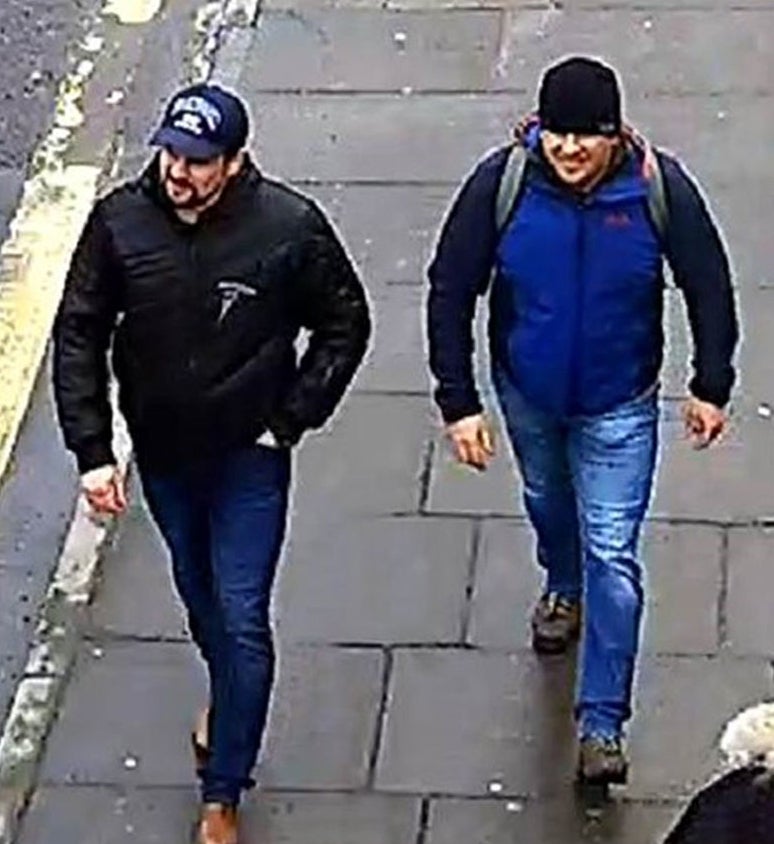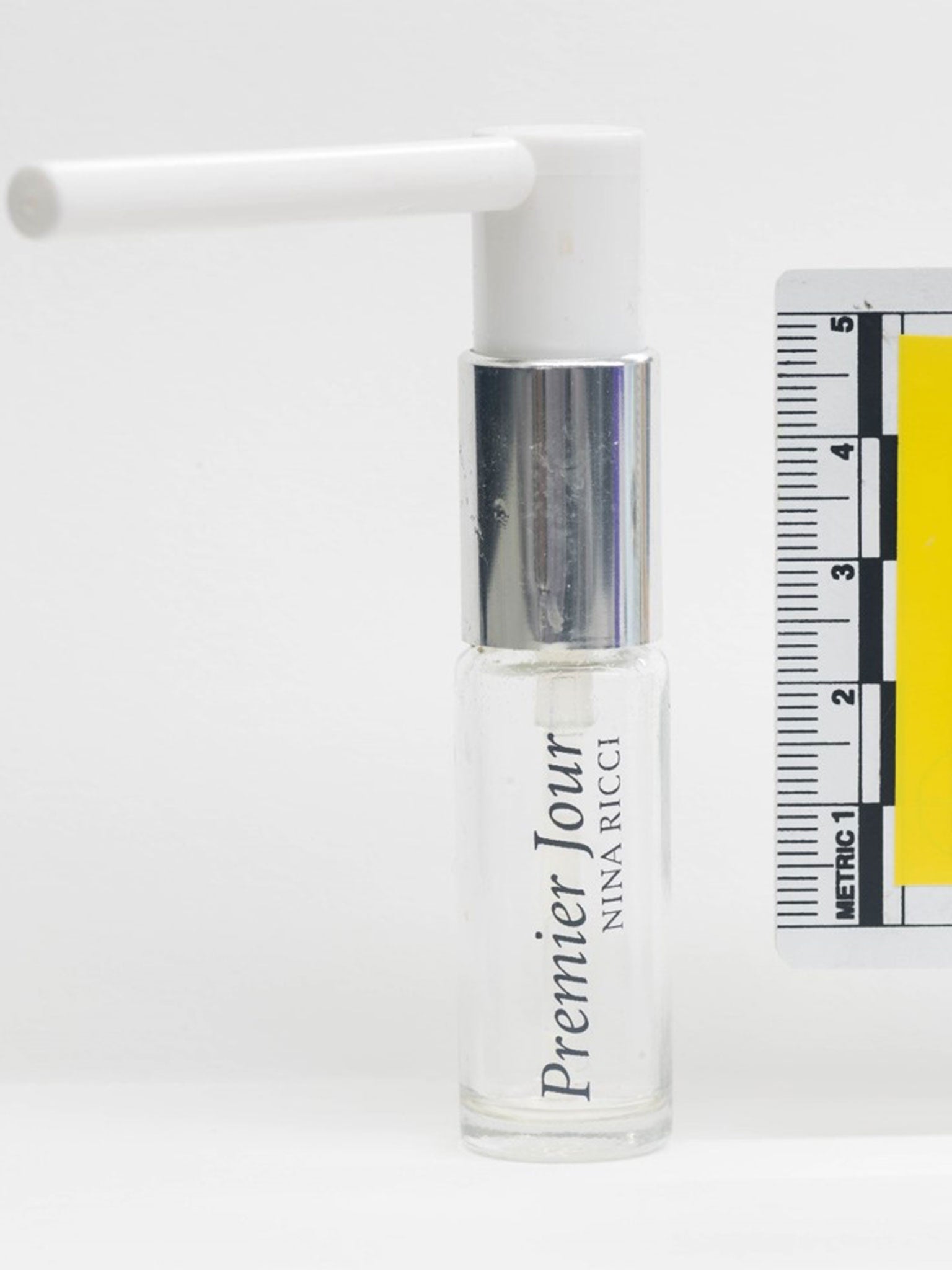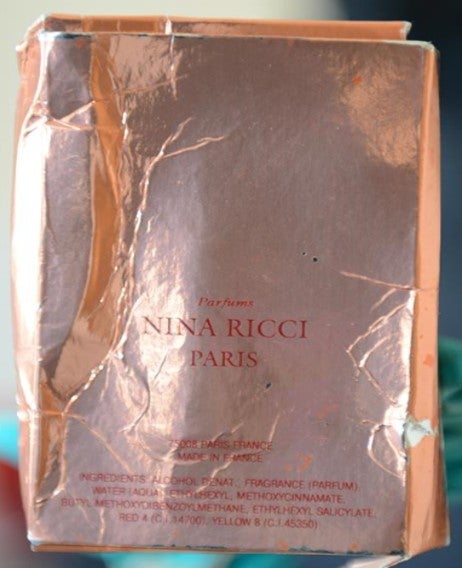The two men charged with carrying out the Salisbury novichok attack are Russian spies and their assassination attempt was approved at “a senior level of the Russian state”, Theresa May has said.
The men who travelled to the UK under the names Alexander Petrov and Ruslan Boshirov - believed to be aliases – are “officers from the Russian military intelligence service”, MPs were told.
The prime minister hinted at approval by the Kremlin, saying “The GRU [the intelligence service] is a highly disciplined organisation with a well-established chain of command.
“So this was not a rogue operation. It was almost certainly also approved outside the GRU at a senior level of the Russian state.”
However, asked if she “means president Putin” was responsible, Ms May declined to name him, replying: “I mean a decision, outside the GRU, at a senior level of the Russian state.”
The deputy chairman of the Conservative party, James Cleverly, hinted at new pressure for international action, tweeting: “Our response must be both internationally coordinated and robust.”
Delivering a statement, Ms May said the conclusions were based on “a body of intelligence” gathered by investigations by the security and intelligence agencies.

She told MPs: “We were right to say in March that the Russian State was responsible. And now we have identified the individuals involved, we can go even further.”
And she added: “As the Crown Prosecution Service and police announced earlier today, we have obtained a European Arrest Warrant and will shortly issue an Interpol red notice.”
A formal extradition request was “futile”, because Russia had “repeatedly refused to allow its nationals to stand trial overseas, citing a bar on extradition in its constitution”.
But she vowed: “Should either of these individuals ever again travel outside Russia, we will take every possible step to detain them, to extradite them and to bring them to face justice here in the United Kingdom.”
Conservative MP Bob Seely, a former army captain who sits on the Foreign Affairs Committee, said the GRU was a major instrument of Russian “hybrid warfare” and had been involved in the annexation of Crimea and downing of MH17.
“We shouldn’t be under any illusion that naming the suspects will bring them to justice,” he added. “If anything, they are sadly likely to become heroes of the Russian state.”
Sergei Skripal served in the GRU for more than a decade before passing secrets to MI6 that unmasked undercover Russian spies in Europe.
He was sentenced to 13 years in prison for treason by espionage in 2006, but freed four years later as part of a high-profile spy-swap and flown to Britain.
It was assumed that Mr Skripal would be given a new identity and secret home, but he lived an apparently quiet life under his real name in Salisbury.
In response, Jeremy Corbyn said Labour would back any “reasonable and effective” actions against Russia and the GRU, adding: “We utterly condemn this appalling attack".
But the prime minister made a veiled criticism of the Labour leader as she thanked the SNP Westminster leader, Ian Blackford, for his outright condemnation of the Russian state.
“I would only wish that that clear condemnation would be possible from the leaders of all parties in the House,” she said.
In March, Mr Corbyn drew widespread criticism – including from many Labour MPs – for refusing to directly condemn Moscow over its alleged responsibility.
Under questioning from MPs, Ms May declined to say why she thought the attack had been carried out, saying that was “up to the Russian state to explain” and adding: “All we have had is obfuscation and lies.”
The prime minister said that the Soviet Union developed novichoks in the 1980s in a secret operation codenamed Foliant, and Russia has produced and small quantities of the nerve agents over the past decade in violation of the Chemical Weapons Convention.
“During the 2000s, Russia commenced a programme testing means of delivering nerve agents, including by application to door handles,” she added.
Earlier this year, the national security advisor revealed that Russia had been spying on Sergei and Yulia Skripal for at least five years before the attempted assassination in March,

In a letter to Nato, Sir Mark Sedwill revealed that they were the subject of “interest” from the Kremlin’s security services since 2013.
He said email accounts belonging to Ms Skripal had been targeted by cyber specialists the GRU and that even after being handed over to Britain, Mr Skripal may still have been seen as a target.
“It is highly likely that the Russian intelligence services view at least some of its defectors as legitimate targets for assassination,” he added.
Vladimir Putin’s government has repeatedly denied any involvement in the Salisbury attack, or breaking the Chemical Weapons Convention, and says all its stockpiles were destroyed.
The Kremlin repeated denials of any involvement in the Salisbury or Amesbury poisonings following Wednesday’s announcement, which a foreign ministry spokesperson claimed the suspects’ names and photos “say nothing to us”.
The suspects wanted for the Salisbury attack fled back to Moscow hours after putting novichok on Mr Skripal's front door on 4 March, police said.
They may have used the same “perfume bottle” that poisoned Dawn Sturgess and Charlie Rowley in June.
Investigators said the men were both using legitimate passports issued by the Russian government and have “travelled extensively” to the UK and other nations in the past, but could not confirm whether they had links to the Kremlin or Russian intelligence agencies.
Police have not been able to rule out the existence of other items containing novichok in Britain, and are appealing for guests who stayed in the same London hotel as the alleged assassins to come forward after traces of the nerve agent were discovered in their room.
“Clearly this was assassination attempt carried out by people involved in this tradecraft,” Assistant Commissioner Neil Basu, the head of UK counterterror policing, told journalists.

He said novichok was smuggled into Britain inside a counterfeit Nina Ricci Premier Jour perfume that had been “specially adapted” to contain novichok and distribute it through a pump, adding: “We don’t yet know where the suspects disposed of the novichok they used to attack the door, where Dawn and Charlie got the bottle that poisoned them, or if it is the same bottle used in both poisonings.”
The two named suspects flew into the UK from Moscow on 2 March and fled back to Russia within hours of allegedly planting the nerve agent at Mr Skripal’s home two days later.
They have been charged with conspiracy to murder Mr Skripal and the attempted murder of the former Russian double agent, his daughter and police officer Nick Bailey, who fell ill after visiting the house.
The men have also been charged with use and possession of novichok contrary to the Chemical Weapons Act and causing grievous bodily harm with intent to Ms Skripal and Mr Bailey.
They have not yet been charged with offences in relation to the poisoning of Mr Rowley and Ms Sturgess, who died days after being exposed to novichok on 30 June.
The Crown Prosecution Service (CPS) is not applying to Russia for an extradition warrant because the country's constitution does not permit the extradition of its own nationals.
Instead, European Arrest Warrants and Interpol red notices have been issued, meaning the suspects can be arrested if they leave Russia.
Anyone with information is asked to contact the investigation team in confidence on 0800 789 321 or email Salisbury2018@met.police.uk.
The Independent has launched its #FinalSay campaign to demand that voters are given a voice on the final Brexit deal.
Sign our petition here







